On the birthday of a well-known linguist, vice-rector for scientific work of the KCSU Sergey Pazov, the WAC web information portal publishes an interview with this enthusiastic professional and interesting.
Interview by Lyudmila Aysanova.person.
Well-known linguist, professor, vice-rector for scientific work of Karachay-Cherkess State University (KCSU) Sergey Pazov devoted decades of life to the development and popularization of the Abaza language. On the eve of his birthday on April 5, the WAC web information portal talked with him about the problems and prospects of preserving indigenous languages, the process of training future teachers of the Abaza language and literature, as well as personal and professional plans.
– Sergey Umarovich, you have been working at the KCSU for almost 40 years. When you came here after completing graduate school in Tbilisi, did you assume that you would tie your fate with one university for so long?
– I started working at the Karachay-Cherkess State Pedagogical Institute in September 1981 (now it is a classical university - ed.). If I thought how long I will work here? Most likely no. Without any methodical training - in graduate school we did not study pedagogy, methodology, but we did intensively in linguistics and related sciences - the first years I was more concerned with how to structure classes so that students at least understand me and what I say. Fortunately, before my eyes were the methodological techniques of my teachers.
The experience came later. Then I calmly delivered lectures, conducted seminars. But I still often left the audience displeased - did not have time to say everything I wanted. Later I learned to select the most important thing, and with those who were interested in deeper knowledge, to work separately, individually.
– Feels like you truly love your job..
– I liked the work and still like it. True, the administrative [part of the work] now takes a lot of time, it is not always possible to study the many problems of linguistic Abaza studies outlined earlier.
– Sergey Umarovich, I would like to hear your opinion on pedagogical education in the Republic - as a specialist who knows the situation from the inside. Your university is known as the forge of teaching staff of the KChR. What do you think allows it to keep this bar today?
– First of all, it is a university that trains an absolute majority of specialists for the education system of the Republic, and is the only one of its kind where scientific and pedagogical personnel are trained in the Abaza language and literature not only in the region, but in the world. I’m not saying that it is very good, [that there are no other such universities], but the fact remains.
Secondly, the profession of a teacher has always been in demand by society - despite the low salaries and not always respectful attitude towards people who are preparing a generation of young people who [themselves] are destined tomorrow to engage in the education and upbringing of the younger generation. And the future of the country, the state and the people depends on how this upbringing will be, what skills the young will acquire.
– As far as I know, some time ago there was a decline in interest in the humanities. How are things now with the recruitment of students, in particular, the future teachers of the Abaza language and literature?
– Lets face it: there were times when we graduated more specialists than today, and more prepared ones. Today, we receive as applicants, with rare exceptions, graduates of schools with an average Unified State Exam score below 60. This means that the university is forced to take part of the hours allocated by the program to teach students the theory and methods of teaching, innovative methods to study envisaged by the high school program.
However, the admissions campaign of 2018–2019 was a little encouraging - there was a small contest for applicants for the Abaza branch of the Institute of Philology [KCSU], there is a choice. If in recent years 3 people were recruited without competitive selection for the three planned seats, and it happened that they were not picked up, this year there were more applications than in previous ones. In the current academic year, the Abaza department, with an enrollment plan of 3 people, received 4 people for a bachelor’s degree, and 2 - for a magistracy. We hope that this positive trend will continue, and we will be able to produce more trained specialists. This is the result of the great work of the staff of the department and the entire university, headed by the rector Tausoltan Uzdenov to attract high school graduates to the university. And also, of course, [the result of the work] of a group of enthusiasts from the team of Mussa Ekzekov and his organization “Alashara” for the preservation and development of the Abaza language and culture.
We cannot say “everything is gone” and give up. There are many difficulties. We need to look for ways to solve them. This is what the department and the whole university are doing today, as a whole.
– Please tell us a little about this work and about the support to students who have chosen the path of professionals in the field of native language.
– University lecturers are active developers of state standards and programs in native languages and literature, compilers of school and university textbooks and teaching aids, guidelines, test materials, and so on. Moreover, in recent years, on the initiative of the rector, applicants who have entered the university with a Unified State Exam score above 60 and studying for “good” and “excellent” have been paid a triple scholarship from extrabudgetary funds. A program is being developed which provides for the support of an applicant, student, specialist by three organizations at once: a school, a university, a district or city government body. The university is ready at the expense of its extrabudgetary funds to send to the training or internship both teachers and professionals working with students during teaching practice.
– Speaking specifically about the department of the Abaza language and literature, what are its successes and life now?
– At the department for the last couple of decades, there has been a very painful change of generations. I mean that Abaza philology has lost such great scholars and famous teachers as professor Rauf N. Klychev and associate professor Kasei Azhumarovich Batalov over the years. These were specialists, whose names are connected with the very history of the formation of the department and the scientific school. According to their works today students are taught.
Nevertheless, today, the department employs Ekaterina Medzhidovna Batalova (Shkhaeva), associate professor Lilia Kyaschifovna Pazova, who give lectures and conduct practical classes at the department. The head of the department is a young, promising literary critic Amir Valerievich Klychev. All of them have scientific and methodological works, developments, which students use. On the basis of the department there is a postgraduate study in the Abkhaz-Adyg languages.
The success of the department can also be attributed to the fact that the Center for the Study of the Abaza Language and Culture was opened here and on the initiative of the Rector, the literary-artistic and scientific-educational magazine “Abazashta Adzykhkva” was established (“Springs of Abazashta” from the Abaza language - ed.), which will be published in full in the Abaza language.
– You have already mentioned the contribution to the preservation of the language of the autonomous non-profit organization “Alashara”. Please tell us about the university’s cooperation with “Alashara” and the results of this interaction.
– For the fourth year we have been conducting jointly the Klychev Readings, the Tabulov Readings, the Festival of the Abaza Language and Literature, and separate studies on the Abaza language and culture.
On the initiative of the “Alashara” and personally Mussa Ekzekov, creative relations were established with one of the country's leading scientific centers, the Institute of Linguistic Studies of the Russian Academy of Sciences (abbr. ILS RAS) - ed.). Academician Nikolai Kazansky, the scientific director of this institute, was already here with us, and met with young people at the base of the ANO “Alashara”. A cooperation agreement has already been signed between KCSU and ILS RAS. Active work is in progress.
“Alashara” has programs for reprinting works of art and research, for expeditions, collecting and organizing ethnographic material, and much more. I was able to participate in the development of the “Alashara” program, aimed at preserving and developing the Abaza language for 2016–2025. Now I take part in its implementation and examination of individual events.
– How does the state help in solving problems of language preservation?
– Different measures are taken to preserve the native language and literature in different regions. In particular, special state programs have been adopted in Kabardino-Balkaria and a number of other subjects of the Russian Federation. There is no such program in Karachay-Cherkessia, but there is a law on native languages and a number of policy documents aimed at learning the native language in urban schools; certain privileges are provided for teachers of the native language and literature of rural schools.
On behalf of the Head of the Republic, the Government of the KChR annually finances the publication of textbooks, manuals and methodological works on native languages and literature, measures are taken (including the necessary funding) to include textbooks on languages and literature of the peoples of the KChR in the Federal List of Textbooks.
– What is your opinion as a linguist on the measures, in general, that should be taken in the near future to stop the process of losing the language by small nations?
– I believe that first of all it is necessary to achieve at the state level changes in the program for pre-school educational institutions (PSEI) and to provide for their activities in their native language. All troubles start from there. Sociological studies have shown that children of two or three years old, who already speak a good mother tongue, after half a year of attending kindergarten almost stop talking to their peers, and often at home, in their own language. This is the cost of the education system.
I also consider it necessary in the Karachay-Cherkess Republic to adopt at the level of the subject of the Federation a special program for the development of the languages of the peoples of the KChR, where you can include all the necessary activities.
And one more important event, in my opinion: at the level of the Ministry of Education and Science of the KChR, at the level of city and district departments and departments of education, it is necessary, as in previous years, to introduce full-time inspectors to monitor the quality of teaching the native language and native literature.
It is also necessary to establish closer contacts with foreign diasporas. I took part in the activities to develop writing in my native language for foreign diasporas. At first it was difficult, most of the representatives and leaders of foreign diasporas were inclined to create writing based on the Latin alphabet. However, there were those who supported the proposal to put the Cyrillic alphabet as the basis for new writing and thereby make us closer. Especially writing on the basis of the Cyrillic alphabet already existed by that time about 80 years. After two or three years, it was possible to convince the majority of the prospects for Cyrillic writing. Today they already use it abroad. It is necessary to resume this work and help the diaspora with textbooks, methodological developments, and training of teachers.
– Over the years, many successful joint projects with the Republic of Abkhazia in the field of languages have been implemented. What are the results of cooperation?
– There are many projects, but not all have been brought to its logical conclusion. The projects of “Alashara” just provide for this joint work. This also applies to the compilation of joint dictionaries, the implementation of joint expeditions, the study of problems of interaction and mutual enrichment of languages.
At the stage of elaboration, a joint project of compiling the Abaza-Abkhaz (Abkhaz-Abaza) dictionary, learning borrowed vocabulary and using the Abkhaz language in the Abaza language instead of borrowing its own words and, conversely, Abaza words in the Abkhaz language. The same goes for the common alphabet. Here we need a lot of preliminary research, as well as sociological, public, explanatory work. This business is not one year old, but it is necessary to continue and move forward.
– Sergey Umarovich, let me ask you a personal question. What line of activity have your children chosen? Did any of them follow in your footsteps?
– Children all have higher education. The eldest, Maryat, graduated from the journalism department, then graduate school, defended her dissertation on small genres of Abaza literature, worked for a long time as a teacher in the department of literature and journalism of our university, she was given the academic title of associate professor. She got married and, as it happens, is currently temporarily not working in her specialty, busy raising children. She lives in Adygea, near Krasnodar. The son Marat graduated from the Faculty of History, then graduate school, but he found himself in a completely different profession - he became a military man, serving in the Rosguard. The youngest daughter, Mariana, graduated from the Russian State University of Trade and Economics and at the same time in absentia the department of foreign languages. Now she is working in the United States. It turns out that the eldest daughter is continuing the profession of parents. We have another teacher in our family - our daughter-in-law Rita, an excellent teacher, candidate of pedagogical sciences.
– Your many years of work, success in science, education, social activities are effective and meaningful. What do you consider your main achievement? Who inspires and supports you in life?
– I am flattered, of course, by this assessment of my work. Thanks. But, believe me, I understand perfectly: compared to what needs to be done, what has been done is almost nothing. I am proud that I managed to convey to a certain number of young people, former students, certain knowledge. I am pleased to meet them and talk with them about their successes. I am glad that I was able to bring to a certain level several researchers who successfully defended their dissertations and continue the study of the Abaza language.
I am especially proud of the fact that I had great teachers who taught me a great deal in research activities in the postgraduate years. I was inspired by my father, mother and spouse, who did everything so that I learned, had the opportunity to conduct research, being away from them. Thanks to them all.
– Many thanks to you, Sergey Umarovich!
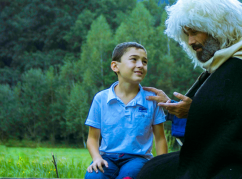
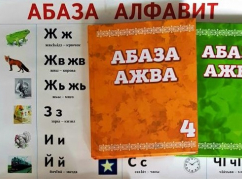
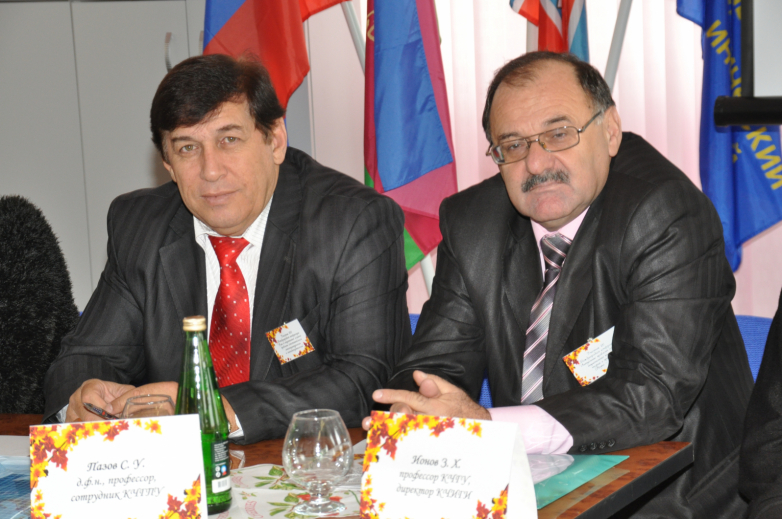
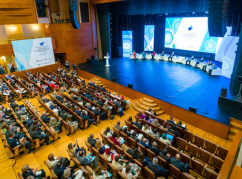
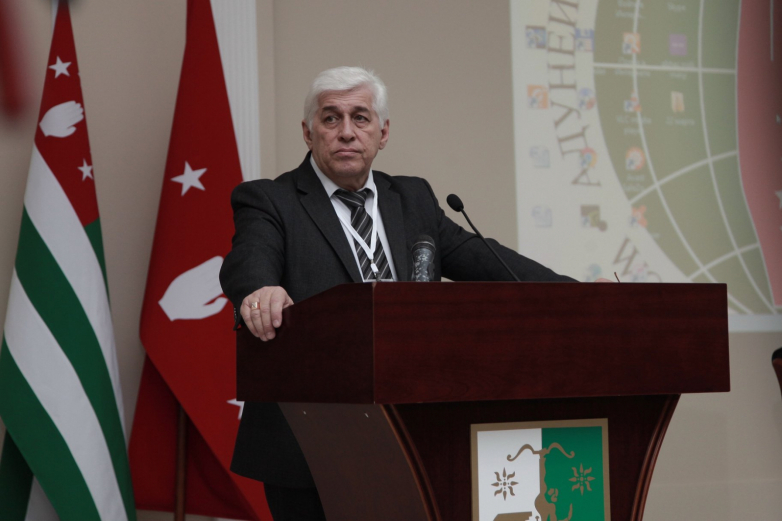
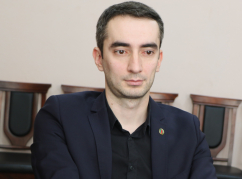
to login or register.